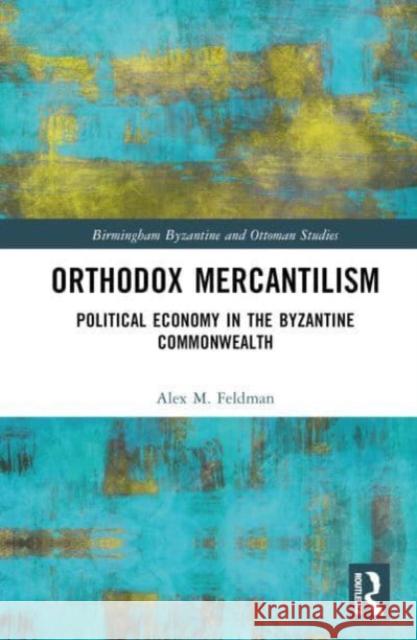


This book demonstrates how the political economy of mercantilism was not simply a Western invention by various cities and kingdoms during the Renaissance.
This is an impressive and engaging book: erudite, personal and passionate as it is dense and demanding. Rich rewards await readers as they are asked to follow a path that draws on a multitude of texts from Antiquity to the last couple of years to weave a gripping narrative of how medieval political, economic and theological systems emerged and grew in the Byzantine world writ large. This is a book about political economy and inequality that clearly demonstrates how the latter’s multiple forms can all be traced back to the same principles. Alex Mesibov Feldman guides us confidently through his meticulously collected material to explore the past but without ever losing sight of the present. He proudly follows in the footsteps of writers such as Marcel Mauss and David Graeber whose brilliant scholarship was also ultimately about justice.
Dionysios Stathakopoulos / Assistant Professor in Byzantine History, University of Cyprus
A Zero-Sum World
Pronoia: Orthodox feudalism?
Mercantilism 101
What was the “Byzantine Commonwealth”?
1. Byzantium: nation-state or civilization-state?
2. Did Byzantium generate a “commonwealth”?
3. How should the œcumene be interpreted?
The Œcumene
Chapter 1
The Byzantine Commonwealth unfolds
Byzantium and the baptism of Vladimir, 986-989 – the problems of the sources
The evidence of Cherson’s involvement in the Phokas rebellion, 987-989
A reassemblage of the revisionist hypothesis, 987-989
Chapter 2
The Rus’ian metropolitanate: “proto-state” or exarchate?
Beyond Commonwealth
Byzantine western exarchates of the 6-8th c.
The loyalty of the thema of Bulgaria after 1019
The metropolitanate of Rus’ia reconsidered
The Law
Chapter 3
From customary law to Christian law
The Russkaja Pravda (11-12th centuries)
Byzantine legal influences in the expanded Russkaja Pravda
The adoption of the Zakon Sudnyj Ljudem (9-12th c.)
From the Zakon Sudnyj Ljudem to the Kormčaja Kniga
Chapter 4
Overlapping sovereignties: empire, commonwealth and jurisdiction
Orthodox tax, debt and property law to the 13th century
Orthodox tax, debt and property law since the 13th century
The Coin
Chapter 5
The hoarding period: Eastern Europe, 11-14th centuries
Bullion, deniers and debasement
Barter, debt and law
Imagined borders
Chapter 6
Sovereignty and bullion: 13-17th centuries
Coins of the Romanía dynasties
Coins of the Œcumene dynasties
Cycles of Divergence and Convergence
Misconceptions of feudalism and mercantilism
1. The misconception that Roman laws and feudal laws have been different
2. The misconception that feudalism has been exclusive to Latin Christendom
3. The misconception that feudalism and mercantilism have been mutually exclusive economic systems
The contested inheritance of Byzantium’s political economy and rhetoric
Orthodox ecumenism
Rex Catholicissimus, the Spains and “The Powerful Mr. Money”
Pravoslavie, the Russias and “The Artery of War - Money”
The Great Divergence?
Ecumenical sovereignty and the national idea
Liberal interpretations of zero-sum economic history
Bibliography
Primary Sources
Secondary Sources
Index
Alex M. Feldman is the chair of the department of languages and literature at CIS-Endicott International University of Madrid. He received a BA from Roger Williams University of Rhode Island and received an MRes and PhD from the University of Birmingham. He has held a postdoctoral fellowship at the University of London’s Warburg Institute and has taught at the Rosenbaum Yeshiva of North Jersey, the State University of New York, Rockland and the University of Birmingham.
1997-2026 DolnySlask.com Agencja Internetowa







